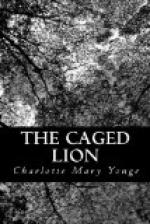When the death-hush was broken by the ‘Depart, O Christian soul,’ and Bedford, with a face white and set like a statue, stood up from his knees, and crossed and kissed the still white brow, it was to Malcolm as if the whole universe had become as nothing. To him there remained only the great God, the heavenly Jerusalem into which the King had entered, and himself far off from the straight way, wandering from his promise and his purpose into what seemed to him a mere hollow painted scene, such as came and went in the midst of a banquet. Or, again, it was the grisly Dance of Death that was the only reality; Death had clutched the mightiest in the ring. Whom would he clutch next?
He stood motionless, as one in a dream, or rather as if not knowing which was reality, and which phantom; gazing, gazing on at the bed where the King lay, round which the ecclesiastics were busying themselves, unperceiving that James, Bedford, and the nobles had quitted the apartment, till Percy first spoke to him in a whisper, then almost shook him, and led him out of the room. ‘I am sent for you,’ he said, in a much shaken voice; ‘your king says you can be of use.’ Then tightening his grasp with the force of intense grief, ’Oh, what a day! what a day! My father! my father! I never knew mine own father! But he has been all to Harry and to me! Oh, woe worth the day!’ And dropping into a window-seat, he covered his face with his hands, and gave way to his grief: pointing, however, to the council-room, where Malcolm found Bedford writing at the table, King James, and a few others, engaged in the same manner.
A few words from James informed him (or would have done so if he could have understood) that the Duke of Bedford, on whom at that terrible moment the weight of two kingdoms and of the war had descended, could not pause to rest, or to grieve, till letters and orders had been sent to the council in England, and to every garrison, every ally in France, to guard against any sudden panic, or faltering in friendship to England and her infant heir. Warwick and Salisbury were already riding post haste to take charge of the army; Robsart was gone to the Queen, Exeter to the Duke of Burgundy; and as the clergy were all engaged with the tendance of the royal corpse, there was scarcely any one to lessen the Duke’s toil. James, knowing Malcolm’s pen to be ready, had sent for him to assist in copying the brief scrolls, addressed to each captain of a fortress or town, announcing the father’s death, and commanding him to do his duty to the son—King Harry VI. Each was then to be signed by the Duke, and despatched by men-at-arms, who waited for the purpose.
Like men stunned, the half-dozen who sat at the council-table worked on, never daring to glance at the empty chair at the upper end. The only words that passed were occasional inquiries of, and orders from, Bedford; and these he spoke with a strange alertness and metallic ring in his voice, as though the words were uttered by mechanism; yet in themselves they were as clear and judicious as possible, as if coming from a mind wound up exclusively to the one necessary object; and the face—though flushed at first, and gradually growing paler, with knitted brows and compressed lips—betrayed no sign of emotion.




